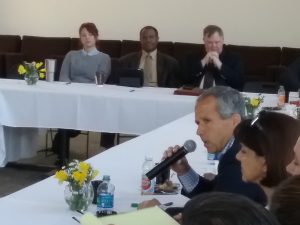Business owners share their concerns with Cook Co. leaders
By Kevin Beese For Chronicle Media — April 11, 2017
Cook County Commissioners (from left) Jeff Tobolski, Richard Boykin and Sean Morrison listen to business concerns during a West Cook Economic Summit. (Photo by Kevin Beese/for Chronicle Media)
The numbers can be daunting for Cook County businesses.
Cathy Yen, executive director of the Oak Park Chamber of Commerce, said because of the higher taxes in the county, Deno Andrews, the owner of Felony Franks, has to sell 20,000 more hot dogs to have the same bottom line at his North Avenue location in Oak Park than he would have to if his business was 10 miles to the west, in Elmhurst and DuPage County.
“A coffee shop has to sell 20 to 40 percent more (in Cook) than a coffee shop in Elmhurst,” Yen said. “A lot of people are eager to start businesses in Cook County, but there are higher employer taxes. Don’t forget a lot of business owners didn’t realize the property taxes would be what they are.”
Taxes being paid by Cook County businesses was one of the biggest concerns expressed at a recent Economic Development Summit held by Cook County Commissioners Richard Boykin, Sean Morrison and Jeff Tobolski.
Andrews, who only hires individuals who have been in prison, said he wants to help employees get better jobs but that has gotten increasingly more difficult. He said the tax burden he faces makes it tough to help employees financially.
“I pay more in property taxes each month than I pay any single employee,” Andrews said at the March 24 summit.
The restaurant owner said he regularly sees individuals check their bill after being hit with a 10 percent tax on their order when non-Cook County communities are charging sales tax rates of between 6 and 8 percent.
“They come in to feed their family and they are using pennies and dimes,” Andrews said. “They look at the bill, thinking we did the math wrong.”
Ray Nelson, the owner of five McDonald’s franchises in West Cook County, said the restaurant he opened in Bellwood 20 years ago prospered for a long time.
“But in the last 20 years, a lot of factories, manufacturing and industry have left,” Nelson said. “My business is down 25 percent. We need to bring more people in and provide them with better-paying jobs.”
He said he plans to put $1 million in renovations into the Bellwood restaurant, but recently got word that the village wants a sprinkler system installed as part of the renovations. That is another $100,000 a year added onto the project, he said, a difficult cost to absorb.
Oak Park Mayor Anan Abu-Taleb, himself a small-business owner, said there is a lot of uncertainty facing businesses. He credited elected officials and staff in his village with providing strong leadership and boosting the business environment.
“Four years ago, economic development was nonexistent, we had a dysfunctional Economic Development Commission,” Abu-Taleb said. “The chamber we have now is outstanding. We represent a different way to do business now. Mind-set matters.”
Morrison reminded attendees that the largest taker of commercial and residential tax dollars are the local school systems.

Oak Park Mayor Anan Abu-Taleb. a small business owner, talks to Cook County commissioners about the challenges that businesses face. Abu-Taleb was part of an Economic Summit held by three county commissioners. (Photo by Kevin Beese/for Chronicle Media)
“Taxes are rough. They are an endless cycle,” Morrison said.
Tobolski noted that the county is the government of last resort in many cases, having to pick up the people who fall through the cracks.
“We’re the safety net,” Tobolski said of county government. “Anything the state doesn’t want to deal with gets kicked to the counties.”
Boykin said it is troubling that Cook County lost 60,000 residents last year, the only major county in America to do so. That population loss will have an impact, the commissioner said.
“We will likely lose a congressional seat over it,” Boykin said, “and we will lose federal resources. A lot of the population loss is driven by bad economic policy.”
He pointed to the vacant Corbin Funeral Home in Maywood as an example. He said the funeral home was paying more than $100,000 in taxes and couldn’t sustain keeping the business open.
Boykin added that Maywood also lost its only full-service grocery store, Aldi, this winter because of “low traffic for 10 years, high property taxes and regulations.”
He said the McDonald’s in Maywood pays $100,000 in taxes while the owner of a McDonald’s in DuPage County pays $30,000.
“How do you make the numbers work?” Boykin asked rhetorically. “How can we create commercial vitality? The regulations are almost crushing businesses and their growth.”
Read the current issue of the Cook County Chronicle
Free subscription to the digital edition of the Cook County Chronicle
— Business owners share concern with county leaders —



